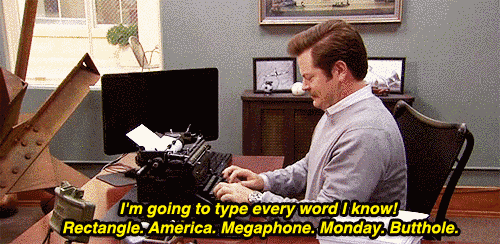Sometimes, we anticipate what’s going to happen in our lives, and yet, it often doesn’t end up work out the way we had planned. Not only is this true in life, but also in writing. Sometimes you start out writing an essay with a clear thesis or point in mind, but then, when you actually start writing, you find that you are pulled in a different direction. I find this to be very true and have figured out some ways to make it work in my favor, instead of against me. 
Just recently I wrote a paper for my history class where I intended to focus on the rhetoric used in historical documents from the suffrage movement. Once I started writing, I realized that my thoughts were creating a trail that moved away from this idea of rhetoric and instead, I found that I was focusing on the way that men were being depicted in these suffrage ads. At first, I was frustrated by this. I thought to myself, “I have a clear topic in mind. Why can’t I just stick with it?” Although this might be easier in retrospect, sometimes, a new topic reveals itself to you once you are actually writing. Here are my tips and comments on how you can keep yourself on topic, even if it means changing your topic.
When you get on a roll, you feel like you have magic fingers and the words just flow directly from your brain onto the page. Let this happen. Even if what you think you’re writing is complete gibberish, you will likely spit something out that you can end up using, or maybe bring up something new that can be used for a different topic.
On the other hand, sometimes, it feels like you can’t write a single word, even if your life depended on it. This is okay too. It happens to everyone at some point in their academic career.

Sometimes the best way to get around this issue is to write whatever pops into your head. Similar to the advice above, eventually, something will grab your attention, and you can pursue something there. Oftentimes, we get so bogged down with ideas we think we need to be writing about that we can’t let our minds be creative. But, just getting some ideas down will help to get your brain thinking about potential topics and move past the feeling of pressure you might have to stay on a particular topic.
If you don’t have to write about something extremely specific, think about the texts you’ve read in class. What’s intrigued you most about your discussions? What sort of questions has your professor flagged? What questions or comments have you been bringing to the table? This will help get your mind thinking about the key ideas your professor is likely to put into an essay prompt and will also get you thinking about the things you’re interested in, which also make the best topics.
Even if your topic seems restrictive, there is always wiggle room, so celebrate the fact that you’re not tied down to one topic, literally or figuratively.
Don’t worry. You got this!
